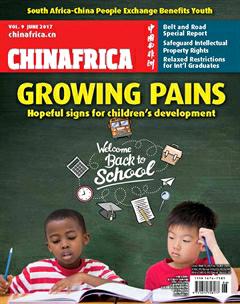Honing Farming Skills
By+Li+Xiaoyu
AniMAl husbandry technician Vasco silva always found it difficult to master the technology applied to artificial insemination (AI) of cattle. However, in December last year, a training course changed the Mozambicans original thought of the technology and the way it is used.
“The systematic training consisted of both theory and practical sections. With practice and deeper insight, I have mastered it,” Silva told ChinAfrica.
The training was given by Fu Youqing, a Chinese senior animal husbandry expert now working in Mozambique. For a week in December, Fu gave training courses on AI technology for cattle at the Animal Husbandry Technology Test Station of Chobela, located 240 km from Maputo, the countrys capital.
Felix King, a technician at the Animal Science and Technology Center of Agricultural Research Institute of Mozambique, said this technology has been promoted in the country since the 1980s. However, it wasnt widely used due to the countrys past civil war. In addition, technicians who had mastered the technology have moved on to other fields, leaving a dearth of skilled personnel.
King said every year many countries dispatch their experts to Mozambique to offer assistance, but due to the constraints of laboratory conditions they left without making progress. “What set the Chinese apart is their practical demonstrations. They work here in a downto-earth manner,” said King.
Hands on approach
As a member of Chinas second group of senior agricultural experts assisting in Mozambique, Fu set foot in the country and began his two-year posting on November 19, 2015. Before coming to the country, Fu was the chief animal husbandry and veterinary expert in Jianli County, central Chinas Hubei Province.
With 18 months experience in Mozambique behind him, Fu believes that to be effective, animal husbandry work should be practical. Cattle embryo transplantation is a typical example. He explained that Mozambique is lacking in both equipment and skilled personnel in this field, so despite the successful testing of embryo transplantation in laboratories, it is difficult to roll this procedure out on a broad scale. He therefore believes technology transfer should be adapted in a format that is easy for local farmers to use.
According to Fu, the low production in Mozambiques livestock farming industry is largely due to the dependence on natural pastures. The promotion of straw silage is therefore another area that requires attention. Silage can adjust the balanced supply of green forage for livestock between rainy and dry seasons. In rainy sea- son, the extra forage could be used for making silage with the preserved nutrients, which could be stored to provide food for livestock in dry seasons.
In 2016, due to the impact of El Ni?o, Fu said persistent drought in southern part of Mozambique caused hundreds of thousands of livestock to starve, leading to serious financial loss for the majority of farmers.
“If ensiling preserving grass work had been done in advance at that time, there would have not been such terrible consequences,” said Fu.
To this end, Fu carried out operational training of the straw cutting machine delivered from China to local technical staff. They were taught about straw silage and hay production. Compared to the Mozambique traditional hand-cut method, the 4-kw small straw cutting machine showed a significant advantage in terms of speed, uniformity, labor efficiancy, and prevention of nutritional losses. One machine can produce 2.5 tons of silage straw per hour, equivalent to 100 farmers workload a day.
Fu makes full use of available equipment while providing training. He said the country now needs small and medium-sized no-till planters, hay balers and straw cutting machines, which are more practical pieces of equipment.
Bright prospects
Fu feels his time in Mozambique has been very valuable.“It would have been a pity had I not come to Africa to experience such a totally different kind of life,” he told ChinAfrica.
But he has also faced his share of challenges. Farming training methods in China follow a trickle down approach, where the skills are first transferred to a certain amount of technicians and then, via them, reach as many people as possible down the line. This improves productivity and can assist with lifting more people out of poverty. However in Mozambique, some people think acquiring funds is more important than skill transfer. Fu said he often uses the old Chinese adage of “it is better to teach people how to fish than just giving them a fish” in his training sessions.
Another challenge was the lack of necessary equipment and drugs to carry out tests. Laboratory equipment is often from different countries, so if a machine breaks down, there are seldom spare parts available. To overcome this, Fu suggested machines from China should have heavy-duty components as well as suppliers providing quality aftersales service.
Yet despite these challenges, he remains an eternal optimist. The natural tropical environment in Mozambique, good weather, warm-hearted people and wide variety of fresh fruits and vegetables are an antidote to any hardships he may encounter. “All problems will be solved if we think more and work harder,” is Fus mantra.

